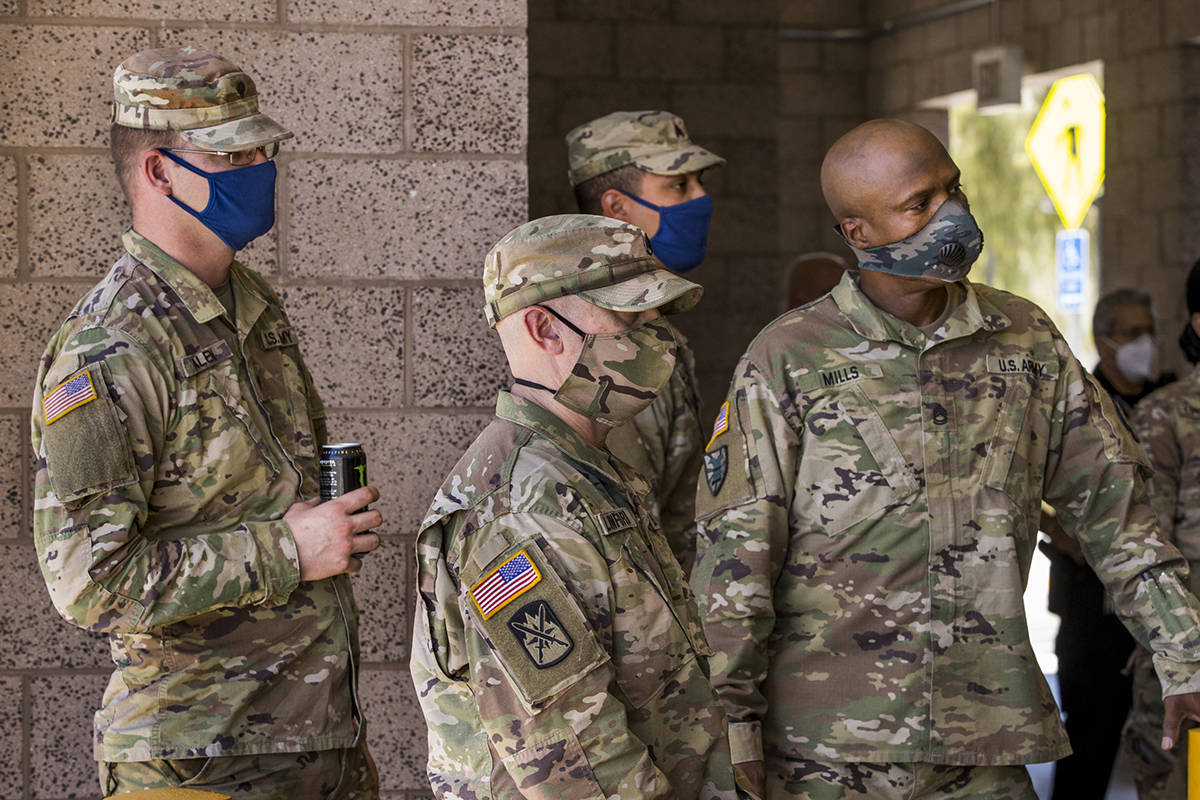Sisolak, trying for more Guard funds, seeks talk with Trump

WASHINGTON — Gov. Steve Sisolak has asked to speak to President Donald Trump to make his case for why Nevada should be removed from the unhappy roster of 45 states that will have to pick up a quarter of the cost of deploying the National Guard as part of the state’s coronavirus response after Aug. 21.
“After the announcement that the federal government would fund 75 percent of Guard activities and leave the remaining balance to states, Gov. Sisolak requested a one-on-one phone call with President Trump to discuss 100 percent federal funding,” Sisolak spokeswoman Meghin Delaney wrote in an email. “At this time, no call has been scheduled.”
“The Governor will continue to advocate for additional federal support to help Nevada’s ongoing response effort,” she added.
Assistant White House Press Secretary Karoline Leavitt told the Review-Journal, “As the president has continually proven throughout the pandemic, he will answer the phone for any governor who calls asking for help. This situation is no different.”
The Federal Emergency Management Agency had been reimbursing states for 100 percent of the cost of National Guard members as they’ve delivered meals, warehoused supplies and helped medical personnel with testing operations, contract tracing and lab administration since mid-March.
Then on Aug. 3, Trump directed FEMA to pay 75 percent of National Guard costs for all states but Texas and Florida. FEMA would continue to pay the full cost of the National Guard to Texas and Florida, two states that supported Trump in 2016, through the end of the year.
On Aug. 7, Trump followed up with three more directives that kept National Guard funding at 100 percent through September for California and Connecticut, two states Hillary Clinton took by 30 percent and 14 percent respectively, and Arizona, which Trump won by 3.5 percent of the vote.
Given the national emergency, there’s no reason states shouldn’t get 100 percent of National Guard costs, Mark F. Cancian, senior adviser at the Center for Strategic and International Studies, told the Review-Journal.
Past reimbursements
While the arrangement seemed unusual to Cancian, Maj. Noel Collins from the Louisiana National Guard told the Review-Journal that after Hurricane Katrina in 2005, Washington agreed to pick up 75 percent of National Guard costs. “We ended up getting 100 percent federal coverage for the National Guard members on Title 32 as well as for the project reimbursements,” Collins said.
Under Title 32, command of Guard units remains with the governor, as opposed to when the troops are called up by the president. Robert Sanders, chairman of the national security department at the University of New Haven, said he has seen “a certain level of politicization” in how Trump has handled the National Guard, including his controversial decision to call the National Guard to clear Lafayette Square.
“There’s no reason why some states would get 100 percent and some states would get 75 percent,” Cancian told the Review Journal.
“As for the reasons the White House has singled out five states, we’ll leave the speculation to others — or the official explanation to the White House itself,” said James Nash, press secretary for the National Governors Association.
Cancian said he has been searching for an explanation for the differences in reimbursements, but White House members don’t explain.
Political controversy
“At a time when the states are suffering dramatic revenue losses as a result of Trump’s catastrophic COVID-19 response, this is no time to place new fiscal burdens onto the states by reducing federal funding for the National Guard,” former Vice President Joe Biden told Politico.
New York Gov. Andrew Cuomo, a Democrat, and Arkansas Gov. Asa Hutchison, a Republican, agreed in a joint statement released by the governors association.
“The devastating economic effects of this unprecedented public health crisis are being felt by Americans all across this great nation,” he said. “Governors not only have led from the front lines to protect our citizens, but also have worked to provide relief to every unemployed American who has been negatively impacted by COVID-19.”
The association has called for Congress and the administration to return to negotiations to come up with a “workable solution” that would include “unrestricted state aid.”
Sisolak, a Democrat, also suggested that Trump work with Congress to “pass a full aid package that helps states fight the virus and protect residents. The Governor will continue to advocate for additional federal support to help Nevada’s ongoing response effort,” according to Delaney.
“This is something that Trump does frequently,” Cancian noted. He wants to “have the governors call, kiss the ring, then they get their money.”
Contact Debra J. Saunders at dsaunders@reviewjournal.com or 202-662-7391. Follow @DebraJSaunders on Twitter.